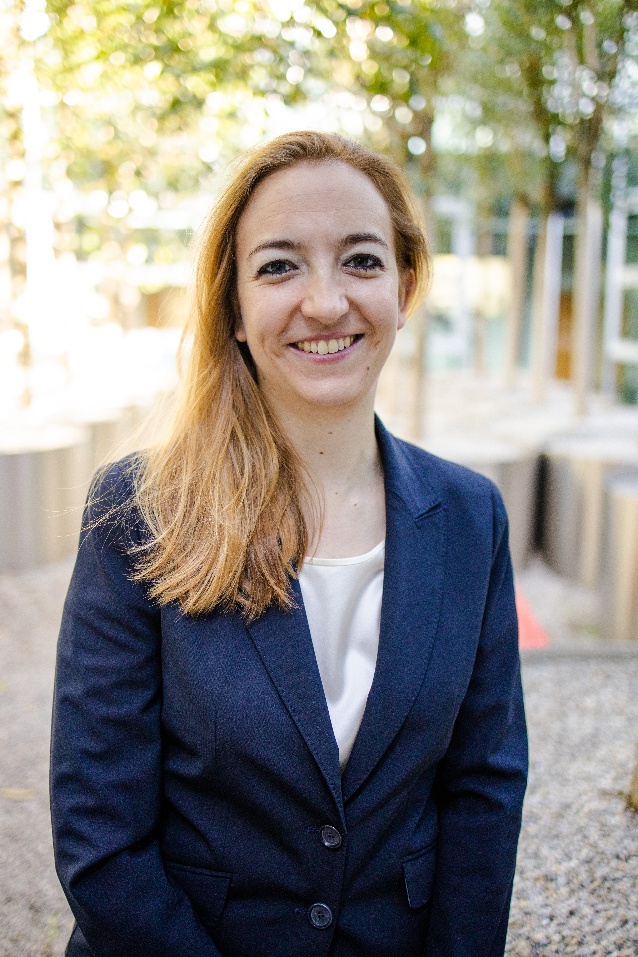To answer the question why an Executive MBA has become an essential resource for medical doctors and health professionals, we sat down with Dr. Vanessa Kraege, recently appointed Deputy Chief Medical Officer at CHUV (Lausanne University Hospital), who completed an EMBA with a focus on Healthcare Management at HEC Lausanne. She shares her personal experience and insights into how the program has impacted her career and leadership, and herself.
As a medical doctor, what first motivated you to pursue an Executive MBA with a focus on Healthcare Management?
 While working as a Cheffe de clinique (Senior resident) in the Internal Medicine Division of the CHUV, I was slowly but surely asked to take on quite a few management responsibilities.
While working as a Cheffe de clinique (Senior resident) in the Internal Medicine Division of the CHUV, I was slowly but surely asked to take on quite a few management responsibilities.
Over time, almost half of my schedule was devoted to managerial tasks. I was in charge of a range of aspects, such as planning timetables for 45 residents, organising their rotations on other divisions, setting up post-graduate training sessions, improving ward and interprofessional organisation, as well as analysing adverse events. I discovered that I enjoyed these missions and was not too bad at them.
Therefore, I sought out additional training and credentials. It was important to me to have a managerial title that would legitimise my decisions and role in the organisation. Furthermore, I felt that it was important to challenge my own way of thinking and the traditional processes in medicine in order to bring new ideas to the table.
After talking to a good friend and colleague who is a very enthusiastic EMBA alumni, I quickly realised that the HEC Lausanne Executive MBA with Focus in Healthcare Management would bring the managerial training and credibility I was looking for.
How has the Executive MBA been impacting your work as a medical doctor and healthcare leader?
Undertaking the Executive MBA program during the challenging COVID-19 pandemic allowed me to practice and apply the management skills I acquired in class every day, as I was in charge of all personnel in one of the most impacted wards (up to 260 patients).
Notably, thanks to leadership and marketing lectures, I was able to convince people effectively of the importance of certain actions that were crucial in times of crisis and communicate them appropriately. Indeed, the EMBA helped me to better present my ideas, market them and rapidly grasp people’s attention.
Overall, my Executive MBA helped me in my career as a medical doctor in ever so many ways, providing me with valuable leadership and management skills that I use every day.
How did your EMBA degree helped you in your recent appointment as Deputy Chief Medical Officer at CHUV?
After completing my EMBA with Focus in Healthcare Management, a position opened at the Medical Directorate that required an executive education background. I applied and got the job! It focuses on looking after medical postgraduate education, including medical demographics and pedagogical innovation.
I also kept on a percentage in internal medicine as PMO for their many ongoing projects. This allowed me to apply my skills in project management, strategy, and prioritisation.
In January 2023, I was appointed Deputy Chief Medical Officer. I continue to look after postgraduate training but also oversee various projects that require not only medical expertise, but also an understanding of financial numbers, health policy, and statistics. Thanks to my EMBA background, I can address these topics more confidently and target how I present solutions to different stakeholders.
Which skills or knowledge obtained from the EMBA curriculum helped you the most to prepare for a leadership position in a major Swiss hospital?
It is difficult to say which skills are the most beneficial, but it would probably be the ones you expect the least when entering an Executive MBA as a medical doctor.
Marketing skills have been key in understanding how to identify and target different audiences, and how to position my message effectively. Leadership and marketing courses taught me how to better address and present to different groups of people inside and outside the hospital.
Then comes statistics. Numbers are everywhere, especially in medicine, so it is very important to be aware of biases and how results can be presented and interpreted in different ways.
Furthermore, the strategic and entrepreneurial aspects of the program have been valuable in terms of experimenting and trying new approaches without fearing failure. This has encouraged me to develop a more entrepreneurial mindset in my work.
Additionally, learning about how the pharma industry works, during the Healthcare Management Focus, was enlightening.
In a nutshell, all EMBA lessons have been applicable to my everyday work as a leader in the hospital.
Is there any other aspects of the programme that have exceeded your expectations?
Before starting the program, I never imagined that I would learn so much, nor how huge the work investment would be, but I also never expected such a high level of excellence from the professors and coaches.
Honestly, what surprised me the most was the coaching: coming from a scientific background, I did not know what to expect. However, my coach, Nancy, was absolutely amazing and the experience eye-opening.
Another aspect that I initially underestimated was the importance of networking. I used to believe that hard work and dedication were enough, but now I understand how crucial it is to have a strong network. Thanks to the EMBA, I have developed relationships with some fantastic people that I can rely on for advice and support.
Compared to your medical study what was different in the EMBA and what did it bring you on a personal level?
When you work in a field like medicine, you see many different people, but projects are often led with colleagues from the same background. I felt the need to explore other topics, discover new cultures and see other ways of thinking. The EMBA class was very multicultural, and it provided me with an opportunity to expand my worldview and interact with people from very different backgrounds.
Moreover, compared to very impersonal medical studies, where you are but one out of over a hundred students in a class, the EMBA program was very personal, everyone was encouraged to participate very actively and teachers invested a lot into discovering who we were, even before they met us.
It was a very personal experience, and it opened my mind to new ideas and perspectives. Additionally, the program required us to read materials that I would not have otherwise read, which was very enriching.
Some argue that pursuing a business-oriented education like an Executive MBA may lead doctors away from public sector healthcare and global health goals. What would you say to these sceptics?
I believe that there are two kinds of physicians.
There are those who are tired of practicing medicine and do not enjoy seeing patients anymore and therefore are looking for an alternative career path, and that’s okay.
On the other hand, there are individuals, like me, who are passionate about patient care, and explicitly because of that, they want to continue to develop their skills and get the tools to better defend patients’ interests and the medical profession. These individuals can use their EMBA education to support and defend the healthcare profession while continuing to ensure quality care is provided to patients.
How does this last question connect with your personal situation?
In my opinion, there’s no contradiction between my current management role and my previous function. In fact, as recently as two months ago, I was on call 24/7 for a full week and actively caring for patients.
Metaphorically, I really want to bridge the existing gap between the medical directorate building and the main hospital one. I want to keep the contact with the field, to see and feel firsthand what the teams are going through, how things are evolving, what new problems have occurred etc.
I believe it’s hard to stay in touch with the clinical side of things unless you actively make an effort to do so. Yet, this is crucial to make informed decisions that will be suited to and accepted by healthcare workers. To me, that’s what real leadership looks like, going back and observing how the teams are coping, also on Christmas Day or at 2 am at night.
Do you think executive education can play a role in helping healthcare professionals effectively address today’s challenges?
Healthcare faces many challenges nowadays. Society keeps demanding increased healthcare, with people living longer but potentially becoming more polymorbid. There is also less respect for healthcare professionals than in the past, with patients often becoming violent, verbally or physically, or questioning our expertise versus what Google says. Healthcare professionals used to work long hours and accept difficult conditions but got some compensation from societal respect for their work, which is no longer the case.
To be able to advocate for more resources and defend the importance of healthcare, it is essential to speak the language of financial and government institutions. Understanding other models and systems is also crucial.
The Executive MBA program can provide healthcare professionals with the necessary knowledge and skills to face these challenges and take on leadership roles in healthcare.

Credits : Pictures by C.Strahm (L’Elixir)